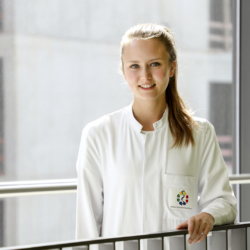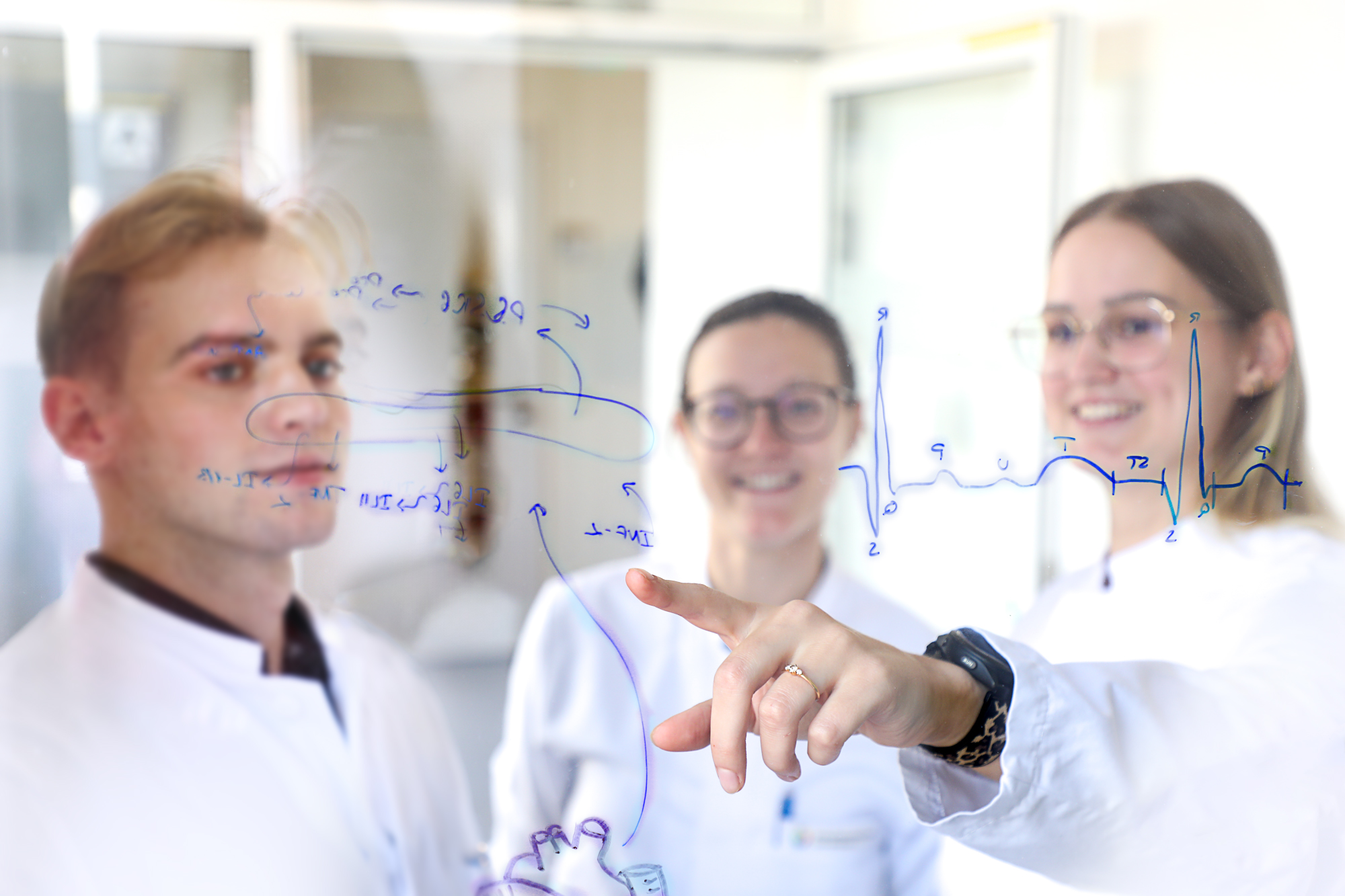
Contact
Head of Research
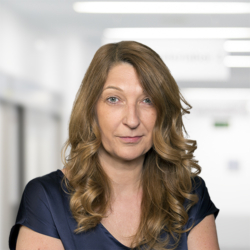
Prof. Dr. rer. nat.
Ulrike Hendgen-Cotta
Department of Cardiology & Vascular Medicine
AG Hendgen-Cotta
Location: MFZ R. 3.016
Prof. Dr. rer. nat.
Ulrike Hendgen-Cotta
Principal Investigator and Head of the CardioScienceLabs
MFZ, Room 3.016
Prof. Dr. rer. nat. Ulrike Hendgen-Cotta received her Diploma in 2004 from the Ruhr University Bochum in Biology with the specialization in Parasitology and Neurobiochemistry. She performed her diploma thesis with focus on the insect vector of Chagas Disease. In 2008 she earned her Dr. rer. nat. at the University Essen-Duisburg, Faculty of Biology, under the mentorship of Prof. Rassaf and Prof. Bayer with the thesis „Myoglobin-mediated reduction of nitrite to nitric oxide: Impact on the myocardial ischemia/reperfusion injury. Since 2009 she joined the RWTH Aachen, Department of Cardiology, Pneumology and Angiology and the University Hospital Düsseldorf, Department for Cardiology, Pneumology and Angiology, as the Experimental Leader of the Heisenberg-Group of Prof. Rassaf and as Head of the Cardiology Lab since 2010. In August 2015, she moved to the University Hospital Essen where she is currently Head of the CardioScienceLabs at the Department of Cardiology and Vascular Medicine and Principal Investigator. In 2017 Prof. Dr. rer. nat. Hendgen-Cotta obtained habilitation and venia legendi in Experimental Cardiology („Impact of Nitrite and Nitrate on Pathological and Aged-related Alterations of the Cardiovascular System“). In 2023, she obtained her extraordinary professorship (apl. Professor) at the University of Duisburg-Essen.
My lab aims to integrate physiological, pharmacological, biochemical and molecular techniques to study basic and translational aspects relating to the physiopathology and treatment of cardiovascular diseases. Particular interest is on myocardial injury in ischemia/reperfusion and cancer therapy with main focus on regulation of mitochondrial energetics and integrity, calcium cycle, nitric oxide metabolism, associated BNIP3 signal transduction mechanisms and posttranslational protein modification as tractable therapeutic targets.
Find a list of my publications at Pubmed
Science Management
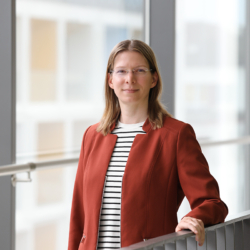
Dr. rer. nat.
Saskia Giesemann
Department of Cardiology and Vascular Medicine
Location: Room 1-87
Dr. rer. nat.
Saskia Giesemann
Department of Cardiology and Vascular Medicine, Room 1-87
Saskia completed her training as medical-technical assistant (MTA) at the Elisabeth Hospital Essen after 3 years in 2010. Following, she received her Bachelor’s degree in the field of Biodiversity at the University of Duisburg-Essen and completed her Master’s degree at the University of Bayreuth in stable isotope ecology. Subsequently, she started her Ph.D. studies at the department of Agroecology (University of Bayreuth), which she successfully defended in 2022.
Saskia supports the CardioScienceLabs and the Department of Cardiology and Vascular Medicine since August 2022.
Science management, Promoting young talent, Research funding, Event scheduling, Good scientific practice
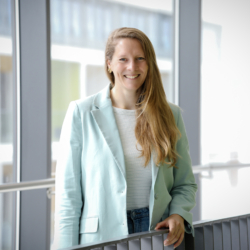
Dr. rer. nat.
Katharina Groll
DFG Research Training Group 2989
Location: Room 1-87
Dr. rer. nat.
Katharina Groll
After training as a dietician, Katharina received a Bachelor degree in Biology from the Ruhr University Bochum. This was followed by a Master’s degree in Molecular Biomedicine in 2016 and a PhD at the Institute of Neuropathology in Münster in 2021. Following Katharina worked in the project management of clinical studies and as a Postdoc at the Institute of Neuropathology in Essen. Since July 2024 Katharina is responsible for the organization of the Research Training Group 2989.
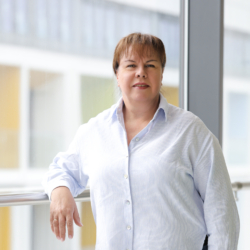
Dr. rer. nat.
Steffi Kuhfittig-Kulle
AG Hendgen-Cotta
Location: MFZ R. 3.026
Dr. rer. nat.
Steffi Kuhfittig-Kulle
Steffi studied Biomedicine at the Russian State Medical University and obtained her Diploma in Biochemistry. Following, she started her PH.D. studies at the Institute of Genetics in Halle (S.) and completed them successfully. After five years as a Postdoc at the Biological Faculty of the University Duisburg-Essen, she continued her work at the Department of Pediadric Hematology and Oncology at the University Hospital Essen.
Steffi supports the RTG 2989 and the CardioScienceLabs at the Department of Cardiology and Vasculare Medicine since June 2024.
Senior Scientists
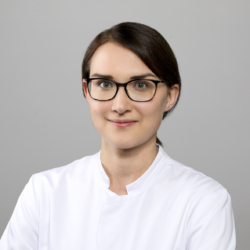
PD Dr. med.
Christiane Jungen
AG Jungen
Location: MFZ R. 2.023
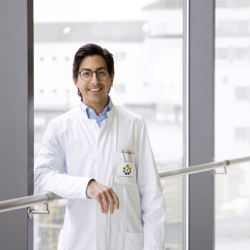
Dr. med.
Daniel Messiha
AG Messiha
Location: MFZ R. 2.019
Dr. med.
Daniel Messiha
Location: MFZ R. 2.019
Daniel joined the CardioScienceLabs as a member of the Rammos Lab in 2021. Currently he is working as a clinician scientist in the clinic of cardiology and vascular medicine of the university hospital Essen in the working group of Professor Rammos with a special focus on management of acute cardiovascular diseases.
Daniel is examining the interplay between the oral-gut microbiome axis and acute cardiovascular diseases like myocardial infarction and acute limb threatening ischemia. Through clinical trials and basic translational research projects he is currently exploring new mechanisms of microbiome-mediated metabolites to improve outcomes after acute cardiovascular events.
With his expertise in genomic analysis and non-invasive cardiac imaging, he is key researcher in the small-animal ultrasound facility of the CardioScienceLabs.
Find a list of my publications at Pubmed
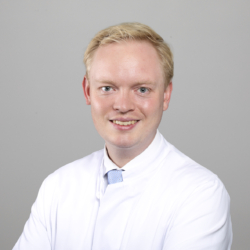
PD Dr. med.
Lars Michel
AG Michel
Location: MFZ R. 2.023
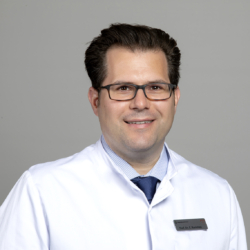
Prof. Dr. med.
Christos Rammos,MHBA
AG Rammos
Location: MFZ R. 2.019
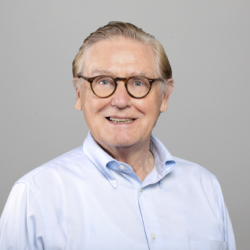
Prof. Dr. med.
Jürgen Schrader
AG Schrader
Location: MFZ R. 3.016
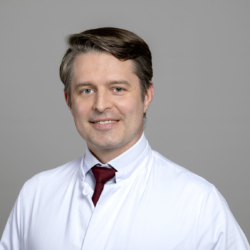
Prof. Dr. med.
Matthias Totzeck
AG Totzeck
Location: MFZ R. 2.022
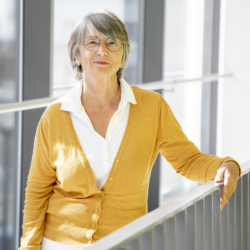
Prof. Dr. rer. nat.
Elke Winterhager
AG Winterhager
Location: MFZ R. 3.016
Prof. Dr. rer. nat.
Elke Winterhager
Emeritus Consultant – Hendgen-Cotta Lab
MFZ, Room 3.016
Prof. Dr. rer. nat Elke Winterhager studied Biology from 1966-1969 at the RWTH Aachen and received her Diploma (MSc) in 1976 and in 1980 her PhD on configuration changes of rhodopsin in crayfish eyes using freeze-fracturing at the Forschungszentrum Jülich GmbH. She performed her Habilitation and Venia legendi in Anatomy at the Anatomy Department of the Medical Faculty of RWTH Aachen with the topic: Dynamic of cell membranes during implantation in rabbits.
After her research associate position at the Department of Anatomy until 1986 she took over the position of the Study Director and Head of the Department of Reproductive Toxicology at the Gruenenthal Company from 1986 to 1990. In 1990 she got her appointment as a Full Professor (C3) in Anatomy and Embryology at the Medical University of Duisburg-Essen.
After her retirement in 2013 she established the core facility for electron microscopy and was Head of the Electron Microscopic Unit, at the Medical Faculty of University of Duisburg-Essen until 2019. She had several university positions such as Vice president for Research of the University of Duisburg-Essen in 1996-2000 and in 2001-2003 Associate Dean for Research at the Medical Faculty, University Duisburg-Essen.
My former research was centered on morphological, physiological and cell/molecular biological studies of gap junctions – the intercellular channels that allow cells to directly exchange ions and metabolites- in the female reproductive tract such as hormonal regulation of cellular communication, embryo implantation and placentation. I extended my research area to clinical relevant reproductive diseases such as endometriosis, preeclampsia and fetal growth restriction with the focus on different signaling/transport molecules. To resolve the role of gap junctions and other signaling pathways in reproduction, I utilized a variety of preparations, including cell lines, primary cultures, stem cells and transfection of those. Moreover, transgenic animal models and in collaboration with the clinic human tissues were applied. In recent investigations, I try to pin structural changes combined with signaling pathways in complex tissues using different morphological approaches with the focus on 3D-TEM.
Find a list of my publications at Pubmed
Postdoctoral Researchers
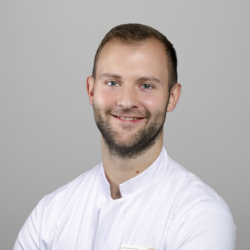
Dr. med.
Florian Bühning
AG Michel
Location: MFZ R. 2.023
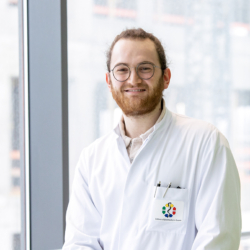
Dr. med.
Elias Haj-Yehia
AG Totzeck
Location: MFZ R. 2.022
Dr. med.
Elias Haj-Yehia
Elias Haj-Yehia joined the CardioScienceLabs as a research member of the group “Acute Cardiac Injury and Repair” of Prof. Dr. med. Matthias Totzeck in 2020. In the same year he started his medical practice in the Department of Cardiology and Angiology of the University Hospital Essen after studying medicine at the University RWTH Aachen. In March 2022 he was awarded a fellowship within the framework of the Junior Clinican Scientist Program and now continues his work by the help of a research grant of the German Society of Cardiology since August 2022.
Currently, Elias’ work is focused on the role of immune cell metabolism within cardiac inflammation. Thereby he takes a closer look on neutrophils. These cells are the first to infiltrate the myocardium during cardiac inflammation e.g. in the context of ischemia reperfusion injury, but their exact role is not fully understood. Due to the fact, that their function is closely linked to their metabolism, Elias investigates metabolic alterations of these cells with regard to opportunities for new therapeutic targets in cardiac inflammation.
Find a list of my publications at Pubmed
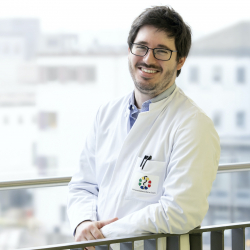
Dr. rer. nat.
Sebastian Korste
AG Totzeck
Location: MFZ R. 2.022
Dr. rer. nat.
Sebastian Korste
Postdoctoral Fellow – Totzeck Lab
MFZ Room 02.022
Sebastian Korste joined the CardioScienceLabs as a research member in 2015 after graduating from the University of Bielefeld with a Master of Science in Molecular Cell Biology. In 2020, he was awarded his PhD for his work on the development of a 3D myocardial damage analysis tool for the evaluation of multi-target cardioprotection strategies. He now continues his work in the CardioScienceLabs as a postdoctoral researcher in the group of Prof. Dr. Matthias Totzeck.
Myocardial Infarction is the leading cause of death worldwide. Cardiac tissue damage is mainly subjected to duration of ischemia and the detrimental effects of reperfusion. To date, there is no therapy available to lessen the burden of this phenomenon called ischemia/reperfusion (IR) injury. This is in part attributed to the fact that earlier suggestions focused on one cellular entity rather than decreasing cardiomyocyte death rate, preserving endothelial integrity and modulating immune response at the same time. These multi-target strategies promise a better transition from bench to bedside than previous tries.
My work focuses on the role of neutrophil-mediated cardiac damage in in vivo, ex vivo and in vitro models of IR injury. The overlaying goal is to find novel therapeutic targets for myocardial IR injury. Furthermore, I specialize in complex 3D cardiac imaging and image analysis like light sheet microscopy.
Find a list of my publications at Pubmed
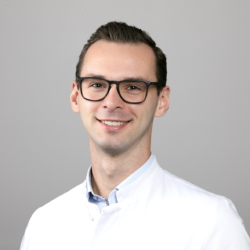
Dr. med.
Tobias Lerchner
AG Michel
Location: MFZ R. 2.023
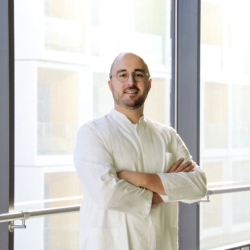
Dr. rer. nat.
Yanis Mouloud
AG Jungen
Location: MFZ R. 2.023
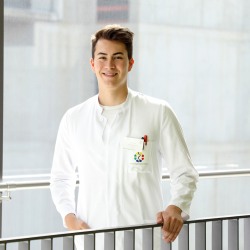
Dr. med.
Fabrice Reyes
AG Michel
Location: MFZ R. 2.023
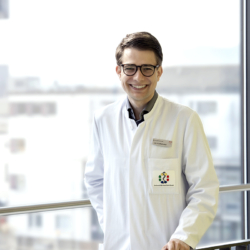
Dr. med.
Stephan Settelmeier
AG Michel
Location: MFZ R. 2.023
Dr. med.
Stephan Settelmeier
Stephan joined the CardioScienceLabs as a member of the Hendgen-Cotta Lab since 2019. He was awarded a fellowship within the framework of the Junior Clinician Scientist Program in 2020. Since 2021 he participates in the Clinician Scientist Program of the University Medicine Essen Clinician Scientist Academy funded by the Deutsche Forschungsgemeinschaft.
Currently, Stephan is examining the mechanisms of mitochondrial structural and functional damage related to cancer-therapy to find new ways to protect mitochondria from perturbation and people from developing heart failure.
With his expertise in invasive and non-invasive cardiac imaging, he is key researcher in the small-animal ultrasound facility of the CardioScienceLabs.
- German Research Foundation grant DFG HE 6317/2-1 – Ulrike Hendgen-Cotta (Nitrite-induced protection of mitochondria in myocardial ischemia/reperfusion-injury)
- Jürgen Manchot Stiftung for Jacqueline Heinen-Weiler (Identification and characterization of the ultrastructural damage of mitochondria in myocardial ischemia/reperfusion injury)
- Medical Faculty of University of Duisburg-Essen funding UMEA Junior Clinician Scientist Program for Stephan Settelmeier
- German Research Foundation funding UMEA Clinician Scientist Program for Stephan Settelmeier
- Medical Faculty of University of Duisburg-Essen funding W.I.R. (Winterseminar Interdisziplinär Reloaded) for Stephan Settelmeier (Investigating the in vivo biodistribution of a novel peptide tracer)
Find a list of my publications at Pubmed
Technical Staff
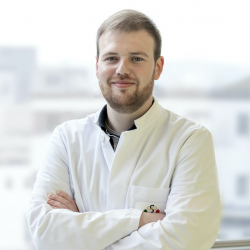
Christoph Jansen
AG Hendgen-Cotta
Location: MFZ R. 3.026
Christoph Jansen
Technical Assistant
MFZ, Room 3.026
Christoph Jesenek completed his training as a technical assistant in biology (BTA) at the Hans-Böckler Berufskolleg, Marl after 3 years in 2012. His career as a research assistant started at Insistitute of Molecular Pathology Institute at the University Hospital Essen. In 2014 he joined the Department of Molecular Opthalmology. Since 2021 he supports the research groups of the CardioScienceLabs.
Molecular genetics, cell culture, western blotting, signaling pathways
Find a list of my publications at Pubmed
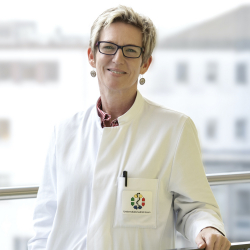
Andrea Odersky
AG Hendgen-Cotta
Location: MFZ R. 3.026
Andrea Odersky
Technical Assistant, Lab Organization
MFZ, Room 2.023
Andrea completed her training as a technical assistant in biology (BTA) at the Rheinische Akademie e.V., Cologne after 2 years in 1994. Her professional career began as research technician at the Department of Ophthalmology at the University Hospital in Cologne. She was trained in 4 laboratories with different research interests: Institute of Cell Biology (University Hospital Essen), Department of Molecular Genetics (University Duisburg- Essen), Institute of Molecular Biology and Biochemistry II (Heinrich-Heine University Düsseldorf) and Department of Pediatric Hematology and Oncology (University Hospital Essen).
With a broad spectrum of different techniques, she has been supporting the CardioScienceLabs since November 2015.
Proteomics, Genomics, Signaling pathways, Mouse experiments, Drug discovery, Cancer, Epigenetics, Anatomy, Good laboratory practice (GLP), Lab organization
Find a list of my publications at Pubmed
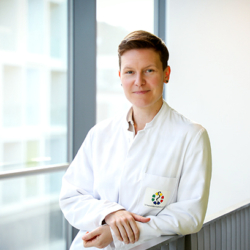
Kristina Piwellek
AG Hendgen-Cotta
Location: MFZ R. 3.022
Kristina Piwellek
Technical Assistant
Kristina Piwellek completed her training as a technical assistent in biology (BTA) at the Lessing Berufskolleg in Düsseldorf 2009. Her dynamic yet successful career as a research assistant began at Institute of Physiological Chemistry at the University Hospital Essen. In 2014, she moved to the Institute for Experimental Epileptology at Life & Brain GmbH in Bonn. Another career move followed in 2017 when she joined the Institute for Cardiology and Angiology st the University Hospital Aachen.
In 2022, her path led her back to Essen, where she joined the Institute for Endocrinology at the University Hospital Essen to support the Heart Project.
Since 2025, she has been contributing her extensive expertise in animal experiments, based on the 3R principle to the CardioScienceLab at the University Hospital Essen.
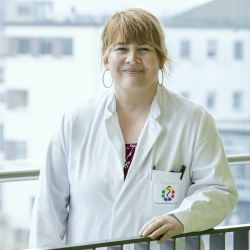
Dipl.-Biol.
Pia Stock
AG Hendgen-Cotta
Location: MFZ R. 3.022
Dipl.-Biol.
Pia Stock
Research Assistant
Head of the small animal phenotyping lab
MFZ, Room 3.022
Pia received her Diploma in Biology with the specialization in Zoology and Parasitology from the Ruhr University Bochum in 2005. In the Heisenberg-Group of Prof. Rassaf at the Heinrich-Heinrich University Düsseldorf 2010, she started her work as a Research Assistant in 2010. Since August 2015, she joined the CardioScienceLabs as head of the small animal phenotyping lab to advance other research projects and to train PhD and MD students in animal experiments according to the 3R principle.
Critical to understanding the processes involved in human cardiovascular disease is the study of comparative models in young and aged mice. They provide comprehensive insights into the extensive aspects that the term cardiovascular disease displays and new approaches to improve the diagnosis and treatment of these pathologies. Models using genetically modified mice by addition or deletion of genes allow the investigation of the causative role of individual proteins in specific cell-types and the evaluation of molecular mechanisms responsible for the development and progression of cardiovascular disease. The use of aged mice allows insights into the age-related progressive deterioration of numerous physiological processes leading to increased risk of health complications and disease. Mimicking disease using surgical models of e.g. myocardial ischemia/reperfusion or chronic ischemia in treated or untreated mice and successively examining whole organ to tissue samples to body fluids can provide important information from the (sub)cellular to the molecular level.
Find a list of my publications at Pubmed
Doctoral candidates
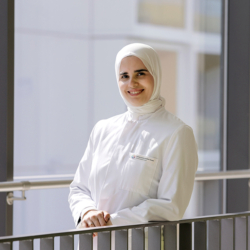
Farah Al Chikhoni
AG Totzeck
Location: MFZ R. 2.022
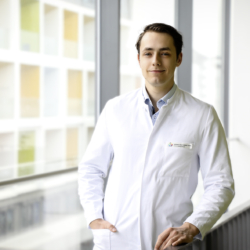
cand. med.
Samuel Dautzenberg
AG Totzeck
Location: MFZ R. 2.022
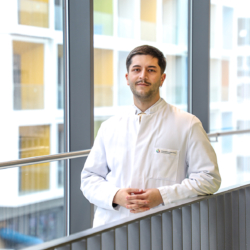
Ibrahim Gadashli
AG Totzeck
Location: MFZ R. 2.022
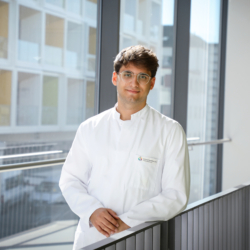
Cyrous Gholamalizadeh
AG Hendgen-Cotta
Location: MFZ R. 2.023
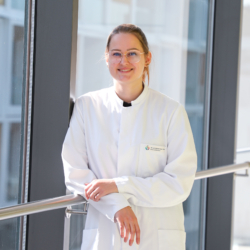
cand. med.
Sofija Giambattista
AG Hendgen-Cotta/Rassaf
Location: MFZ R. 2.023
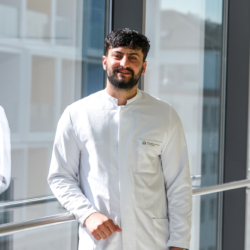
cand. med.
Hunar Haydar
AG Jungen
Location: MFZ R. 2.023
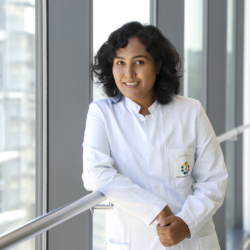
Atefeh Hosseini
AG Hendgen-Cotta
Location: MFZ R. 3.022
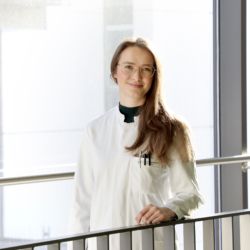
cand. med.
Lea Kolk
AG Michel
Location: MFZ R. 2.023
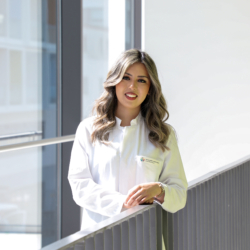
cand. med.
Farida Mahmudi
AG Michel
Location: MFZ R. 2.023
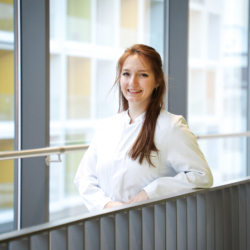
cand. med.
Larissa Ott
AG Messiha
Location: MFZ R. 2.019
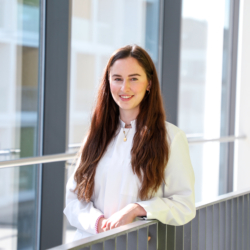
cand. med.
Ann Katrin Principe
AG Hendgen-Cotta
Location: MFZ R. 3.026
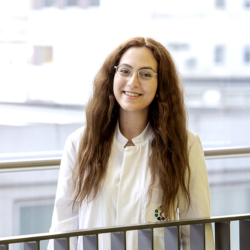
Miriam Rinke
AG Messiha
Location: MFZ R. 2.019
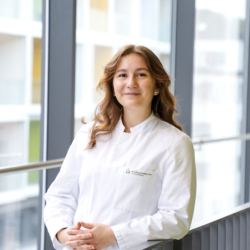
cand. med.
Svenja Roß
AG Michel
Location: MFZ R. 2.023
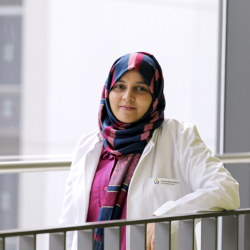
Bushra Saleem
AG Hendgen-Cotta
Location: MFZ R. 3.022
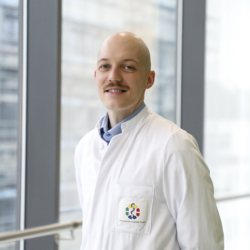
cand. med.
Phillip Schulte
AG Totzeck
Location: MFZ R. 2.022
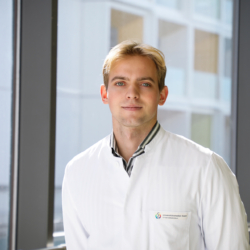
Pavel Skalazub
AG Hendgen-Cotta/Rassaf
Location: MFZ R. 2.023
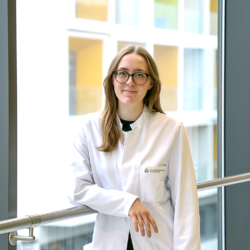
Hannah Wißkirchen
AG Totzeck
Location: MFZ R. 2.022
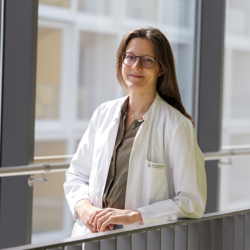
Theresa Zeumer
AG Hendgen-Cotta/Rassaf
Location: MFZ R. 2.023
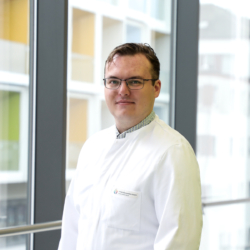
Bosse Zschieschack
AG Michel
Location: MFZ R. 2.023
